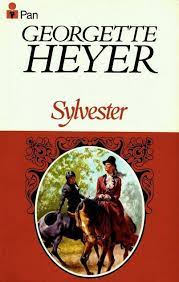Sylvester by Georgette Heyer
I read Sylvester by Georgette Heyer on my first day of my Christmas holiday. I started reading before I got out of bed, kept reading while stirring my breakfast porridge on the stove, continued to read on the couch later in the morning instead of doing something useful, then finished the story sitting outside in the afternoon sun. I had a fabulous day.
Sylvester (the Duke of Salford) had a fairly specific list of what he wanted in a bride – as he told his mother, his potential bride required some degree of beauty, to be well-born and intelligent, possess countenance and elegance. He’d narrowed his list of possibilities to five of the current London debutantes when his mother told him that she and her dear friend had joked about their children marrying each other one day, causing Sylvester to wangle an invitation to meet the Honourable Phoebe Marlow.
Phoebe was not a beauty and her behaviour was rude and hoydenish when she and Sylvester met, so not surprisingly she didn’t meet any of his criteria but as it turned out, Sylvester didn’t meet Phoebe’s idea of a husband either.
Knowing that her step-mother would force her to accept Sylvester if he offered marriage, Phoebe ran away, escorted by her best friend Tom. Obviously (!) their curricle was overturned in a ditch and Tom broke his leg. Holed up in an inn during a snow-storm, guess who turned up next to stay at the inn? Sylvester, that’s who! Funnily enough, Sylvestor turned out to be okay, if a little arrogant, and he and Phoebe became friends during their time at the inn.
When Tom’s father arrived at the inn intending to bring Tom and Phoebe home, Sylvester helped Phoebe to escape so she could stay with her grandmother in London, knowing how cruelly she had been treated by her father and step-mother.
Sylvester’s nose was still slightly out of joint at having been rejected by Phoebe so he decided to make her fall in love with him, but of course Phoebe saw through that and planned to punish him instead. All would have been well had Phoebe not written a book before they met, depicting Sylvester as an evil uncle in a story that co-incidentally mirrored his actual circumstances. The book was published anonymously, but of course Sylvester guessed that Phoebe had written it and that he was the book’s villain.
I liked this story and Phoebe very much, but had mixed feelings towards Sylvester, who had a tendency to bear a grudge and behave spitefully. The supporting characters were fabulous, especially Phoebe’s friend Tom who in my opinion deserves to be the hero of his own Georgette Heyer novel himself one day.
Sylvester and Phoebe’s romance was comparable to that of Elizabeth Bennet and Mr Darcy from Jane Austen’s Pride and Prejudice.






Recent Comments